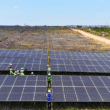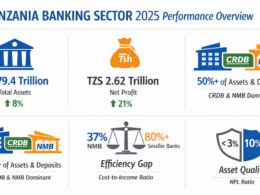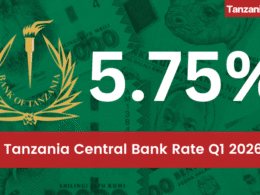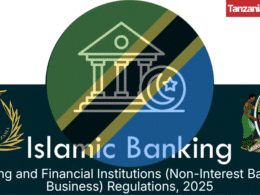TanzaniaInvest interviewed CITI Bank Managing Director Joseph Carasso and he shared important insights on Tanzania’s highly competitive banking industry, the phenomena of mobile money in Tanzania and CITI bank Tanzania’s role in the country’s development and economy.
TanzaniaInvest.com : What CITI Bank Tanzania represents in the CITI Bank strategy in Africa?
Joseph Carasso : We opened in Tanzania in 1995, and since then our Tanzanian franchise has firmed up its position as an important part of our coverage for Africa, which includes presence in 15 countries, and coverage of another 26 countries on a non presence basis. Our Africa Division is head quartered in South Africa, and Citi’s coverage is unparalleled in the market as we cover all the sub-regions; East, Central, West, Southern and North Africa.
Right now the Tanzanian economy holds a lot of potential – with its GDP growth rate averaging 7% per annum, stable and peaceful environment, strategic geographic location and relatively large population – and I believe the country has many, if not all, of the elements to become one of our largest businesses in Africa.{xtypo_quote_right}… I believe the country has many, if not all, of the elements to become one of our largest businesses in Africa.{/xtypo_quote_right}
TI : There are numerous banks in Tanzania, covering different segments. What is CITI Bank’s position in Tanzania?
JC : In Tanzania, as in the rest of the Africa Division, the focus is on institutional banking, that is the government, the banks, the large multinational clients in Tanzania, the regional emerging market champions as we call it and the largest local businesses as well.
TI : What makes the need of this specific clientele unique and why do they need a large player like you?
JC : I think there are several factors. Since the beginning of our expansion within and outside the US, the strategy was to leverage as much as possible our global platforms, enabling consistency of product offering in terms of quality and features. We believe our clientele appreciates and values that. The multi-national clients have the added benefit of being able to run centralized treasuries with a single look and feel of our platforms and similar product capabilities throughout their countries, local regulations permitting.
Our presence in 101 countries worldwide means we can intermediate and facilitate trade and FDI flows to and from Tanzania without intermediaries, therefore more efficiently.{xtypo_quote_left}Our presence in 101 countries worldwide means we can intermediate and facilitate trade and FDI flows to and from Tanzania without intermediaries, therefore more efficiently.{/xtypo_quote_left} And our track record in terms of security is also an important factor to this type of clientele.
TI : With Tanzania having 50 banks and the industry being quite competitive, in your experience is this number enough to serve the market?
JC : 50 Banks seems like a high number, but the industry is changing a lot. Mobile Telecommunications, for example, has managed to change their business model, deliberately or not, making lower revenue generating clients profitable through deployment of technology and adoption of business strategies typical of fast moving consumer goods industries.
It is difficult to predict how the banking industry will change over time – and if 50 banks will be too much in that context, but now the level of competitiveness is very high, with banks not having an easy time.
TI : With the explosion of Mobile Banking in Tanzania, is there still a need for physical banking and if so why?
JC : That is something only time will tell. Mobile banking is a very fascinating area, and one that Citi has taken very seriously from the beginning. In East Africa, this service has an important social role, enabling financial inclusion and allowing lower income and remotely located individuals access to payment mechanisms at low cost. So the potential, and importance, are high.
TI : Do you think we will see mobile operators and banks merging?
JC : The banking industry is a highly regulated industry, so I am not sure if and where the two industries will meet, and to which extent. Because of the importance of this modality of service in terms of social inclusion, we have played an active role in East Africa and Tanzania with the telecom industry to develop a viable mobile money transfer service model.
We also have to consider that a bank is more than just a payment mechanism. There are areas like investment banking and trade finance, to name a few, which have little to no common ground with mobile banking as done today through telecom companies.
TI : What is your own vision here in Tanzania and what are your objectives?
JC : I would like to see us becoming one of Citi’s biggest franchises in Africa. I do not think we should aim for anything less, because there is potential here as I mentioned before.{xtypo_quote_right}I would like to see us becoming one of Citi’s biggest franchises in Africa. I do not think we should aim for anything less, because there is potential here as I mentioned before.{/xtypo_quote_right} So, while I am happy with the relevance of our franchise in Tanzania, I would like it to be a much bigger business.
TI : Compared to other African countries what are the challenges faced to make a business successful in Tanzania?
JC : I do not think it is that much different than most places. The variables change in terms of relative importance but discipline, with tight cost control and an offering that adds value to the local client base, are important.
TI : It is often claimed finding skilled human resources challenge in Tanzania is a. Did you experience this?
JC : I have been in Africa for the past 11 years, having originally come from Brazil. I do not see Tanzania any worse or more challenging than other African countries I have been to or worked in. Citi has been able to attract a good pool of skilled people, so, whilst possibly a factor to consider, I would not see this as a major challenge.
TI : Banks in Tanzania are doing well and they are also champions in assisting the social economic development in the country. What does CITI Bank do in terms of Corporate Social Responsibility?
JC : That is a very important area for us globally and certainly a priority here in Tanzania – to be seen as a responsible member of the business system. It is critical. We have mainly two ways to express this – through various philanthropic schemes that the bank runs, and through direct commercial support of the various sectors of the economy (as part of our normal activities). We actively incentivize voluntary work of our staff, we have the Citi Foundation which supports specific areas such as microfinance, financial literacy and enterprise development, and we run a separate program for ad hoc philanthropic grants.
Just as an example, in Tanzania we have a strong line of support through a program called “Junior Achievers” – a regional organization that helps educate and inspire young people to develop entrepreneurial and life skills through learning by doing. It is our belief that by supporting initiatives such as JA we are contributing to creating meaningful economic participation among young people.
TI : FDI inflow in Tanzania is steadily increasing due to the oil and gas discoveries and the country’s overall growth. Where do you see the most interesting opportunities for your bank?
JC : You are right, oil and gas is a promising sector. I understand that some companies have already discovered significant reserves. That is an important industry, as it has multiplying effects into the economy once it grows. Mining is also another fast growing driving force for Tanzania, with similarly positive multiplying effects into the economy. However the benefits of the growth in such industries may take time to be perceived.
At the early stages of development with heavy machinery and equipment being purchased, little is felt other than an increase in certain expense lines in the country’s balance of payments, with an accompanying increase in the FDI line. With time and with the projects becoming operational, the country benefits from higher tax revenue, employment, and to some extent, import substitution.
One of our main focus areas is on infrastructure. We also focus on utilities (Telecom, Electricity), and large oil traders. The government, being an important player in many sectors, is a big focus as well.
TI : What would be your way of describing Tanzania and telling foreigners about Tanzania?
JC : I think Tanzania has done a lot of good as a country, driven by the reforms the government has put in place since the early 90s. The results are showing now. There would be no 6-7% GDP growth every year if these measures were not taken. So they certainly contributed to put the country in the right direction in terms of providing what I believe is key to investors: a level playing field.
Stability in a country is also critical for investors and Tanzania certainly provides that environment. Off course, tensions to an extent are normal, but Tanzania doesn’t have extreme levels of it be it externally or internally.
So in general a lot has been done in Tanzania in terms of providing the necessary conditions for attracting investment, and this is why we have seen the levels of FDI in recent past.{xtypo_quote_left}…a lot has been done in Tanzania in terms of providing the necessary conditions for attracting investment, and this is why we have seen the levels of FDI in recent past.{/xtypo_quote_left} Hopefully, the trajectory will continue so that the flow of FDI can increase further in the future.
In terms of how Africa compares with the place I came from, there are similarities and differences. In general terms there is more infrastructure in Latin America, and many countries there have been in a reform path for longer than Africa has been. On the positive side, Africa has the opportunity to make use of newer technologies and this has certainly happened for example in telecommunications.
So that is the advantage that Africa has, it has the chance to learn from mistakes from others, and make use of the best technologies which were not available then.
TI : Lastly, on a personal level what would you tell an Investor who was still unsure of investing in Tanzania?
JC : Tanzania is a warm place, and I do not refer only to the weather. People are particularly warm, welcoming, especially if you try to speak Swahili. I think there are well-intentioned regulators and a well-intentioned Government. Investors should not mistake caution, which is abundant, for inefficiency or lack of eagerness.
If people come here with that cultural understanding they will have better chances of succeeding and avoiding frustration. This is not a place of extremes or surprises. And in my time in Africa I do not know of anyone who came to Tanzania and had a bad time or negative overall experience.











